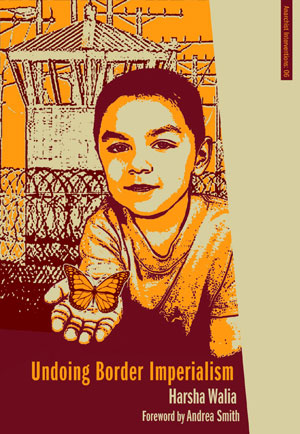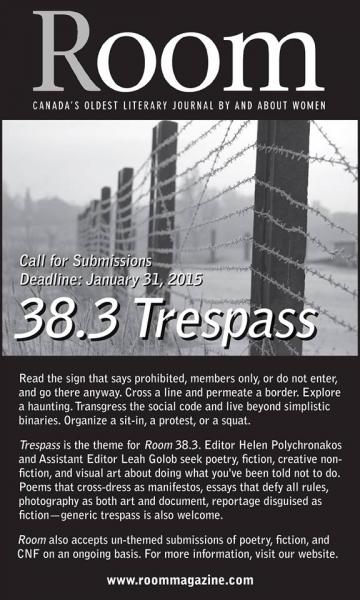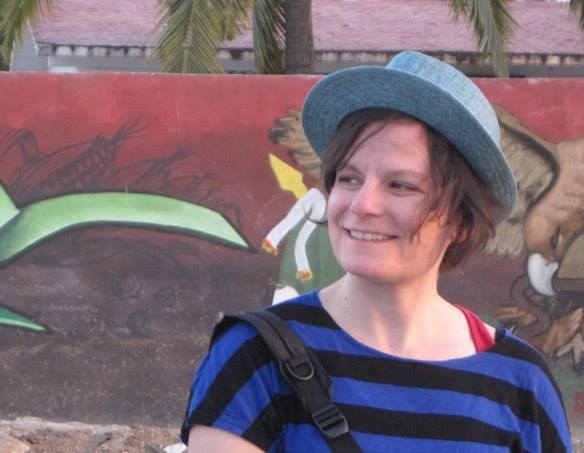In this interview, Lindsay Glauser Kwan talked to Helen Polychronakos about what inspired the upcoming Trespass theme for issue 38.3 and what makes a good submission.
In this interview, Lindsay Glauser Kwan talked to Helen Polychronakos about what inspired the upcoming Trespass theme for issue 38.3 and what makes a good submission. Deadline for poetry, fiction, CNF and art submissions to the Trespass issue is January 31, 2015.
ROOM: What motivated you to join Room magazine’s editorial board?
HP: When I was in university, I worked on the literary journal of the English department. I loved being around people who loved literature as much as I did. My paid job right now is not in the literary arts, and I miss that sort of community. I am always very excited to read new writing, to see what writers are doing stylistically as well as thematically, and I thought being involved with Room would be a great way to keep my ear to the ground of the CanLit scene and women’s writing.
ROOM: What issues have you worked on?
HP: The first issue I assisted on was 35.3 Duality, edited by Amber Hitchen. It was originally an un-themed issue but the submissions, our commission and interview lined up in such a way that we came up with the theme of Duality. Currently, I’m helping Rachel Thompson edit 38.1, In Translation.
ROOM: What has been your favourite issue of Room?
HP: It’s too hard to pick a favourite, but I can tell you about some of the most memorable pieces I’ve read. I’ve just finished 37.4 Claiming Space and enjoyed Hiromi Goto’s story. It’s literary with a touch of horror, and I just love that kind of generic cross-over. I also loved Lori Miller’s interview with Eleanor Wachtel (35.4) who was a founding editor of Room. I have to admit that I’m very partial to 38.1, the issue that I’m helping Rachel Thompson edit. Lots of talent in that one.
ROOM: What are the greatest challenges of editing an issue?
HP: I think that at Room we have always been conscious of diversity, but in the last year or two, we’ve been especially conscious of it. We’ve spent many meetings talking about including trans writers and women of colour or people of colour. Some editors say (not at Room!), “The reason I don’t publish women or people of colour or queer people or indigenous writers is because they don’t submit.” I don’t want to be one of those editors. I want to keep talking about this: How do we reach out in a way that is more effective so that we are really, really, really as diverse as we can be?
 ROOM: What inspired the theme Trespass?
ROOM: What inspired the theme Trespass?
HP: Basically, my feminism inspired it. My preoccupation with freedom from patriarchy and social injustice. Harsha Walia’s book, Undoing Border Imperialism, raised issues that helped me flesh out the theme of Trespass. Harsha talks about national borders, how arbitrary they are, and how they’re used to enact a kind of colonialism that separates the “haves” from the “have-nots”.
For this issue, I’m interested in all boundaries: gender, class, religion … All these arbitrary categories, with no cross-over, no trespass permitted. Who creates those boundaries, and who assigns to themselves the right to enforce them? And why do we submit?
That’s just my personal rant on the theme. I hope that the writers who submit to the issue will help me see different interpretations, too.
ROOM: What kind of submissions are you looking for this issue?
HP: I would like to see some writing that takes on social causes, that’s radical without spoon-feeding ideology. That being said, I hope I’ll get non-political interpretations of Trespass, too. I’m open.
 ROOM: Do you have a commissioned author or interview in place?
ROOM: Do you have a commissioned author or interview in place?
HP: Yes. The commissioned writer is Doretta Lau, who published How Does a Single Blade of Grass Thank the Sun in 2014. I first heard Doretta at a reading last year. I’d been riffling through five years’ worth of Journey Prize anthologies and other eminent collections, but when I heard Doretta read, my search for a writer to commission ended. Her prose sparkles. It’s humorous and original. I was delighted that she agreed. She’s told me that she is working on a piece about racism for Room, and I look forward to reading it.
The Interview is with Harsha Walia, the author of Undoing Border Imperialism.
ROOM: I want to read that book now. It sounds so interesting. What other writers do you enjoy?
HP: Virginia Woolf and Toni Morrison are two of my favourites in terms of classics. When it comes to more modern writers, I’m blown away by Yiyun Li and Arundhati Roy. I find Rachel Rose’s poetry exquisite.
ROOM: What generally makes a good submission? What do you look for in the writing quality?
HP: A strong beginning with no clichés. Endings are important too. They have to be unpredictable. Shocking is even better. But shocking is no good if it’s not also completely and utterly inevitable. I’m exaggerating. I do love these things, but it’s not a formula. As long as the writing captures me and makes me care from beginning to end, I’m in.
Helen Polychronakos has been with Room since 2010. Her poetry and prose have appeared in Plenitude Magazine and Filling Station, and her journalism in Thetyee.ca, rabble.ca, Kyoto Journal: Perspectives from Asia, and others. She is currently writing a book of short stories.















